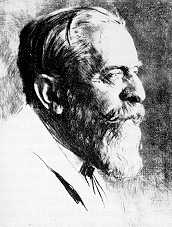| Profile | Major Works | Resources |
Friedrich von Wieser, 1851-1926.

Friedrich von Wiser was a prominent and leading member of the first generation of Carl Menger's Austrian School - together with Eugen von Böhm-Bawerk, his close friend, colleague and, brother-in-law.
Friedrich von Wieser was born in Vienna in 1851 to a notable family of Austrian government officials. His father Leopold von Wieser had been a privy councilor to the Hapsburg emperor Franz Josef since 1858, and ennobled as a hereditary baron in 1889 ("Freiherr von Wieser") . Friedrich von Wieser enrolled at the University of Vienna in 1868 to study law, obtaining his degree in 1872. An early attraction to history and sociology (from reading Spencer) had given way in the course of his studies to an interest in economics. Although his original economics teachers (notably Lorenz von Stein) left him cold, Wieser was converted and spellbound after the appearance of Carl Menger's Grundsätze in 1871. In 1875, Wieser obtained an academic scholarship for a tour of study at Heidelberg, Jena and Leipzig, where Wieser (together with fellow student Böhm-Bawerk) were exposed to the to the German Historical School - attending lectures by Knies at Heidelberg, Roscher at Leipzig and Hildebrand at Jena. Nonetheless, both Wieser and Böhm-Bawerk remained steadfastly by Menger's marginalism.
After a brief period in the Austrian civil service, Wieser returned to academia in 1883, submitting his habilitation and becoming privatdozent at the University of Vienna. The very next year (1884), he became extraordinary professor at the University of Prague. Wieser obtained the full professorial chair in economics at Prague in 1889, coming out with his main work, Natural Value, that same year. Wieser became rector at Prague in 1901.
In 1903, Friedrich von Wieser returned to succeed Carl Menger in the professorial chair at the University of Vienna. Wieser and Bohm-Bawerk groomed the next generation of Austrians (which included L.von Mises, F.A. Hayek and J.A. Schumpeter) at Vienna in the early 1900s. Although famous for his detached Olympian demeanor throughout his life, Wieser eventually entered the Austrian political arena in 1917, being a member of the upper house of the Austrian parliament, and briefly serving as minister of trade in the last Austro-Hungarian imperial government. Returning to academia after the war, Wieser retired in 1923, securing the appointment of Hans Mayer as the successor to his academic chair in Vienna.
Wieser's two main contributions are the theory of "imputation", establishing that factor prices are determine by output prices (rather than the other way around, as the Classicals had it) and the theory of "alternative cost" or "opportunity cost" as the foundation of value theory -- fundamental "subjectivist" pillars in Neoclassical theory which were being effectively ignored by Marshall and the "real cost" British theorists. In developing these ideas, Wieser can be credited with turning Neoclassical economics firmly towards the study of scarcity and resource allocation - a fixed quantity of resources and unlimited wants - all based on the principle of marginal utility. Menger had initially set this up, but never really extended it to production and factors properly. Wieser's imputation theory allowed that single principle to be applied everywhere. Wieser's theory of alternative cost and Marshall's "real cost" theory came into confrontation quickly - Wicksteed and Edgeworth duelled on a version of this, as later did Robbins, Knight and Viner - but today they can be said to be reconciled (for the most part). This was largely achieved by the insights provided by modern linear programming and general equilibrium theory.
Wieser is renowned for two main works, Natural Value (1889), which carefully details the alternative cost doctrine and the theory of imputation, and his Social Economics (1914), an ambitious attempt at a comprehensive restatement of Austrian theory as a whole, and its application to the real world.
|
Major Works of Friedrich von Wieser
|
HET
|
|
Resources on Friedrich von Wieser
|
All rights reserved, Gonçalo L. Fonseca
